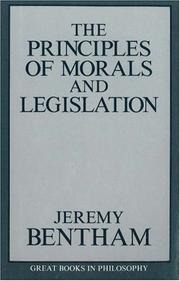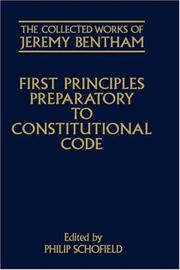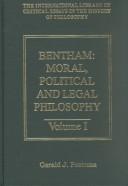| Listing 1 - 10 of 12 | << page >> |
Sort by
|
Book
Year: 2017 Publisher: London, United Kingdom : UCL Press,
Abstract | Keywords | Export | Availability | Bookmark
 Loading...
Loading...Choose an application
- Reference Manager
- EndNote
- RefWorks (Direct export to RefWorks)
The first five volumes of theCorrespondence of Jeremy Benthamcontain over 1,300 letters written both to and from Bentham over a 50-year period, beginning in 1752 (aged three) with his earliest surviving letter to his grandmother, and ending in 1797 with correspondence concerning his attempts to set up a national scheme for the provision of poor relief. Against the background of the debates on the American Revolution of 1776 and the French Revolution of 1789, to which he made significant contributions, Bentham worked first on producing a complete penal code, which involved him in detailed explorations of fundamental legal ideas, and then on his panopticon prison scheme. Despite developing a host of original and ground-breaking ideas, contained in a mass of manuscripts, he published little during these years, and remained, at the close of this period, a relatively obscure individual. Nevertheless, these volumes reveal how the foundations were laid for the remarkable rise of Benthamite utilitarianism in the early nineteenth century. Bentham's early life is marked by his extraordinary precociousness, but also family tragedy: by the age of 10 he had lost five infant siblings and his mother. The letters in this volume document his difficult relationship with his father and his increasing attachment to his surviving younger brother Samuel, his education, his interest in chemistry and botany, and his committing himself to a life of philosophy and legal reform.
Philosophers. --- Bentham, Jeremy, --- Great Britain. --- England.

ISBN: 0879754346 Year: 1988 Publisher: Buffalo Prometheus
Abstract | Keywords | Export | Availability | Bookmark
 Loading...
Loading...Choose an application
- Reference Manager
- EndNote
- RefWorks (Direct export to RefWorks)
Civil law --- Criminal law --- Ethics --- Utilitarianism

ISBN: 0198226098 9780198226093 Year: 1984 Publisher: Oxford: Clarendon,
Abstract | Keywords | Export | Availability | Bookmark
 Loading...
Loading...Choose an application
- Reference Manager
- EndNote
- RefWorks (Direct export to RefWorks)
A critical edition of three works of Bentham, Deontology and The Article on Utilitarianism were previously unpublished. Together with An Introduction to the Principles of Morals and Legislation, they provide a comrehensive exposition of Bentham's views. Based entirely on manuscripts by Bentham of his amanuenses, this edition's full introduction linking the three works. Each work is supplemented with detailed and critical notes.
Ethics --- Utilitarianism --- Hedonism --- Philosophy --- Ethics. --- Utilitarianism. --- Morale --- Utilitarisme --- Deontology --- Ethics, Primitive --- Ethology --- Moral philosophy --- Morality --- Morals --- Philosophy, Moral --- Science, Moral --- Values

ISBN: 0198227477 9780198227472 Year: 1989 Publisher: Oxford: Clarendon,
Abstract | Keywords | Export | Availability | Bookmark
 Loading...
Loading...Choose an application
- Reference Manager
- EndNote
- RefWorks (Direct export to RefWorks)
Constitutional law --- Constitutional limitations --- Constitutionalism --- Constitutions --- Limitations, Constitutional --- Public law --- Administrative law --- Interpretation and construction

ISBN: 1840140380 9781840140385 Year: 2002 Publisher: Aldershot: Ashgate,
Abstract | Keywords | Export | Availability | Bookmark
 Loading...
Loading...Choose an application
- Reference Manager
- EndNote
- RefWorks (Direct export to RefWorks)
Ethics, Modern --- Political science --- History --- 1 BENTHAM, JEREMY --- #SBIB:023.IO --- #SBIB:321H50 --- #SBIB:17H3 --- -Political science --- -Ethics, Modern --- -Administration --- Civil government --- Commonwealth, The --- Government --- Political theory --- Political thought --- Politics --- Science, Political --- Social sciences --- State, The --- Modern ethics --- Filosofie. Psychologie--BENTHAM, JEREMY --- Westerse politieke en sociale theorieën vanaf de 19e eeuw: liberalisme --- Politieke wijsbegeerte --- -History --- -Bentham, Jeremy --- -ベヌサム --- ベンサム --- 벤담 --- Ethics --- Contributions in Political science --- -Filosofie. Psychologie--BENTHAM, JEREMY --- -Ethics --- 1 BENTHAM, JEREMY Filosofie. Psychologie--BENTHAM, JEREMY --- Bentham, Jeremy, --- Bentam, Ieremi︠a︡, --- Bentam, Dz︠h︡eremi, --- Bentham, Jeremías, --- Bentham, Jérémie, --- 邊沁, --- Beauchamp, Philip --- Ethics. --- Ethics, Modern - 18th century. --- Ethics, Modern - 19th century. --- Political science - History - 18th century. --- Political science - History - 19th century.
Book
ISBN: 1911576151 191157616X 9781911576181 1911576186 9781911576150 9781911576198 1911576194 9781911576204 1911576208 9781911576174 9781911576167 1911576178 Year: 2017 Publisher: UCL Press
Abstract | Keywords | Export | Availability | Bookmark
 Loading...
Loading...Choose an application
- Reference Manager
- EndNote
- RefWorks (Direct export to RefWorks)
The first five volumes of the Correspondence of Jeremy Bentham contain over 1,300 letters written both to and from Bentham over a 50-year period, beginning in 1752 (aged three) with his earliest surviving letter to his grandmother, and ending in 1797 with correspondence concerning his attempts to set up a national scheme for the provision of poor relief. Against the background of the debates on the American Revolution of 1776 and the French Revolution of 1789, to which he made significant contributions, Bentham worked first on producing a complete penal code, which involved him in detailed explorations of fundamental legal ideas, and then on his panopticon prison scheme. Despite developing a host of original and ground-breaking ideas, contained in a mass of manuscripts, he published little during these years, and remained, at the close of this period, a relatively obscure individual. Nevertheless, these volumes reveal how the foundations were laid for the remarkable rise of Benthamite utilitarianism in the early nineteenth century.
Diaries, letters & journals --- Philosophy --- Western philosophy: c 1600 to c 1900 --- Ethics & moral philosophy --- Philosophers --- Bentham, Jeremy, --- philosophy --- jeremy bentham --- utilitarianism --- legal thought --- Bowood House --- France --- London --- Panopticon --- Paris
Book
Abstract | Keywords | Export | Availability | Bookmark
 Loading...
Loading...Choose an application
- Reference Manager
- EndNote
- RefWorks (Direct export to RefWorks)
Paul --- the Apostle --- Saint --- Bible. New Testament --- Criticism --- interpretation --- etc.
Book
Abstract | Keywords | Export | Availability | Bookmark
 Loading...
Loading...Choose an application
- Reference Manager
- EndNote
- RefWorks (Direct export to RefWorks)
The first five volumes of theCorrespondence of Jeremy Benthamcontain over 1,300 letters written both to and from Bentham over a 50-year period, beginning in 1752 (aged three) with his earliest surviving letter to his grandmother, and ending in 1797 with correspondence concerning his attempts to set up a national scheme for the provision of poor relief. Against the background of the debates on the American Revolution of 1776 and the French Revolution of 1789, to which he made significant contributions, Bentham worked first on producing a complete penal code, which involved him in detailed explorations of fundamental legal ideas, and then on his panopticon prison scheme. Despite developing a host of original and ground-breaking ideas, contained in a mass of manuscripts, he published little during these years, and remained, at the close of this period, a relatively obscure individual. Nevertheless, these volumes reveal how the foundations were laid for the remarkable rise of Benthamite utilitarianism in the early nineteenth century. Bentham's life in the mid-1790s was dominated by the panopticon, both as a prison and as a network of workhouses for the indigent. The letters in this volume document in excruciating detail Bentham's attempt to build a panopticon prison in London, and the opposition he faced from local aristocratic landowners. His brother Samuel was appointed as Inspector-General of Naval Works and in September 1796 married Mary Sophia Fordyce.
Book
ISBN: 0313223238 Year: 1980 Publisher: Westport (Conn.): Greenwood
Abstract | Keywords | Export | Availability | Bookmark
 Loading...
Loading...Choose an application
- Reference Manager
- EndNote
- RefWorks (Direct export to RefWorks)
Constitutional law --- Political science --- Blackstone, William,

ISBN: 0140432728 Year: 1987 Publisher: Harmondsworth
Abstract | Keywords | Export | Availability | Bookmark
 Loading...
Loading...Choose an application
- Reference Manager
- EndNote
- RefWorks (Direct export to RefWorks)
Ethics, Modern --- Utilitarianism --- Ethics --- Hedonism --- Philosophy --- General ethics
| Listing 1 - 10 of 12 | << page >> |
Sort by
|

 Search
Search Feedback
Feedback About UniCat
About UniCat  Help
Help News
News